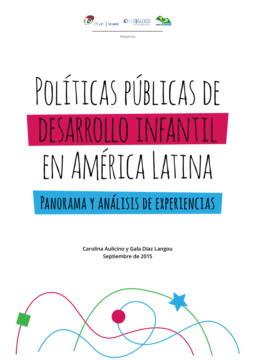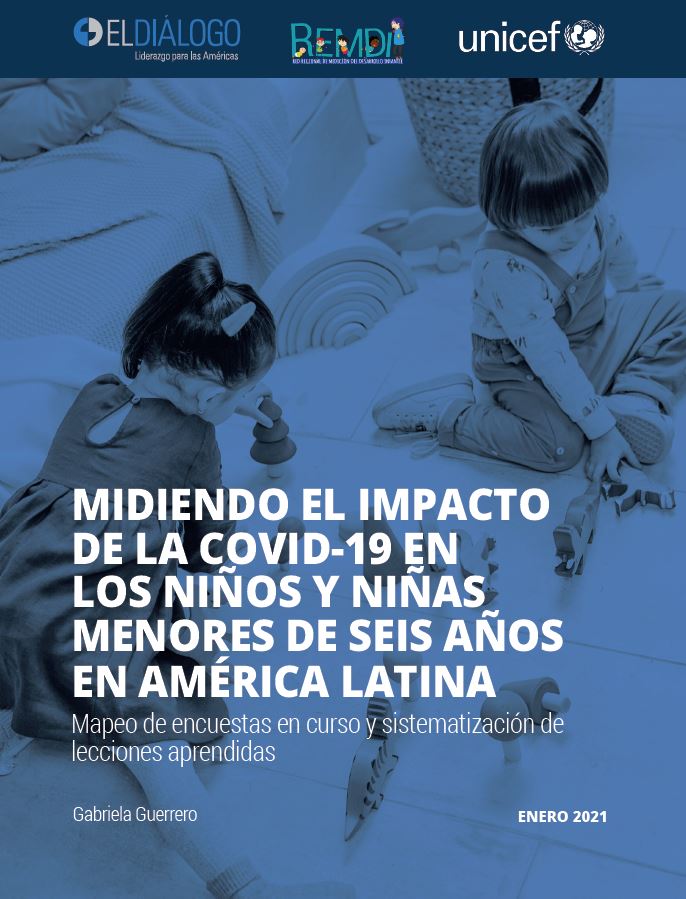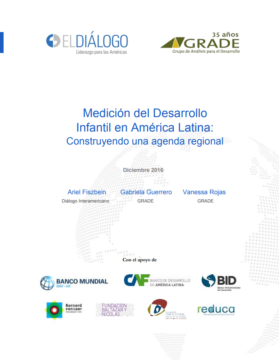
An Agenda for Early Childhood Development
Early childhood development is one of the investments with the highest returns and allows us to achieve, simultaneously, equity and efficiency objectives.
This post is also available in: Español
The following report is only available in Spanish.
Although medically speaking children are not considered a high-risk group for the Covid-19 virus, the impacts of the pandemic on them are significant, especially for those who were already in vulnerable situations before the crisis. On the one hand, Covid-19 limits the opportunities for children to access health, care, education, and social protection services. On the other hand, it increases the risk of nutritional deficiency and of experiencing situations of violence at home. Evidence from previous pandemics shows that there will not only be immediate consequences but also long-term ones for many children, especially for those in early childhood. At the same time, it is evident that the pandemic has also seriously affected adults who live with those children.
Due to the reasons outlined above, in different regions of the world – including Latin America and the Caribbean – it became apparent that there is a need to implement surveys to understand the impact the pandemic has had on families, especially those with children. To date, various countries from the region have already moved forward with designing and implementing this type of survey. In this context and as part of the efforts of the Regional Network for Measuring Early Childhood Development (REMDI) and UNICEF - Regional Office for Latin America and the Caribbean towards achieving the third goal of the Regional Agenda for Early Childhood Development, it was considered useful to conduct an initial mapping of the surveys in progress in Latin America.
This initial mapping has two objectives: a) identifying themes and common interests between the surveys implemented in the different countries of the region; and b) analyzing the strengths and weakness confronted when implementing this type of questionnaire, in particular relating to doing so in a socially distanced environment such as that necessitated by Covid-19.
Stress the value of having surveys about early childhood development. Only five of the ten initiatives reviewed in this report have a clear focus on gathering information about the situation of children under six years of age.
Construct surveys to monitor the impact of the pandemic on children and their families starting with a review of other surveys that currently exist in a country. While this document has explored different forms of previous surveys that may be useful, one focus is that they can function as a baseline that enables the construction of key indicators for health, nutrition, early childhood protection, and other important outcomes.
Promote and consolidate a space for regional exchange between teams from different countries, in such a way that fosters joint learning. The analysis comparing the themes tackled by the different surveys shows that there are common interests, which can promote joint efforts that eventually allow for a comparison of key indicators between countries. REMDI and other organizations from the region can generate these types of exchanges.
Understand the measurement of child development (or some of its dimensions) as an essential part of these surveys. Although generally in all the surveys there was an apparent interest in the emotional state of children, only two of the ten surveys reviewed for this report measured socio-emotional development using an instrument designed for this purpose.
Develop a protocol with guidelines on the design and implementation of surveys in emergency contexts, such as this pandemic or natural disasters, which serves as a guide for the work of teams. So that the information provided by the survey is timely, it is necessary to get out to the field relatively quickly (not too long after the start of an emergency). The experiences reviewed for this report show that this was not always possible because aspects related to the design of the survey were discussed extensively by technical teams looking to create the best questionnaire.
*This report was made possible with the support for UNICEF and REMDI
Early childhood development is one of the investments with the highest returns and allows us to achieve, simultaneously, equity and efficiency objectives.
Measuring early childhood development (ECD) at the national level is crucial for informing policy-making and for evaluating ECD programs in Latin America.
La importancia de los primeros años de vida sobre la formación del capital humano es ampliamente reconocida. ¿Cómo podemos asegurar una oferta de servicios de calidad?
 Cottonbro / Pexels/ CCO
Cottonbro / Pexels/ CCO

